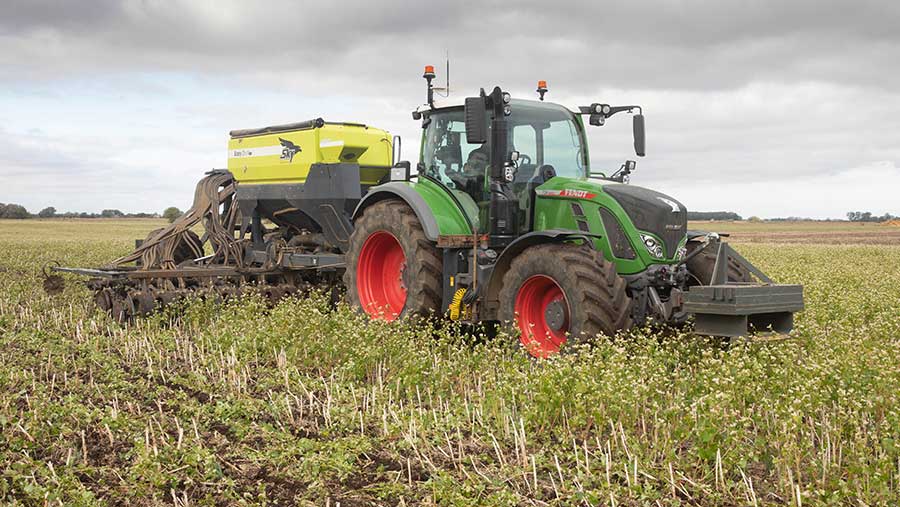Nature-friendly farmers seek climate action from government
 © Tim Scrivener
© Tim Scrivener Regenerative and nature-friendly farming organisations are ramping up pressure on the UK government to go further in its policies for farming to tackle climate change and restore biodiversity.
Ahead of the COP26 UN climate summit in Glasgow next month, two reports have been published by green farming organisations which warn that Boris Johnson’s government must go further in its ambitions for sustainable farming to tackle the nature and climate emergency.
The Nature Friendly Farming Network (NFFN), a UK-wide network of farmers with a passion for sustainable farming and nature, published its report Rethink Farming – A Practical Guide for Farming, Nature & Climate (pdf), on Thursday (21 October).
See also: 5 key changes a farmer made in move to regenerative farming
The 36-page study urges UK agriculture to transition to regenerative and agroecological practices to help restore the natural environment and increase profitability through reduced inputs.
It features 18 case studies of farmers who highlight practical on-farm action that is having a positive impact on their communities to rebuild soil health, prevent floods, protect water quality, enhance carbon management and rebalance ecosystems.
Herbal leys
In the report, James Robinson, an organic dairy farmer based in Kendal, Cumbria, says his 121ha farm has been free of artificial fertilisers or pesticides for the past 16 years.
His approach to supporting nature includes planting multi-species swards, including herbal leys, to help fix minerals in the soil and attract an abundance of birds, mammals and pollinators.
Mr Robinson has also planted woodland and seven miles of hedgerows at the farm, which provide shelter for livestock and “corridors” for red-listed birds and other species such as bats and hawks.
“When you start making room for nature, the place comes alive,” he said.
James Hopkinson, an arable farmer based in Angus and a member of the Soil Regenerative Agricultural Group in Scotland, started his transition to soil-friendly practices in 2016 and began to see the benefits within two years.
He is using cover crops and devoting 10% of productive areas around every field to permanent cover to help boost wildlife.
Mr Hopkinson said the challenge of transitioning from conventional to regenerative agriculture has been to retain a viable, profitable business while reducing inputs which have provided him with consistent yields.
“But with reduced inputs comes reduced borrowing and spend, which in turn, improves cash flow,” he added. “The challenge is in striking the balance between reduced yields and return.”
More ambition
Following the launch of the government’s Net Zero Strategy this week, the NFFN is seeking greater ambition from ministers to elevate the role farming plays in delivery of net zero.
The group is also calling for greater action across farm holdings to prevent “irreversible outcomes” if the trajectory of climate change continues.
Meanwhile, a coalition of agroecological, regenerative farming and conservation organisations published an eight-page paper on Thursday which aims to demonstrate how the wider adoption of sustainable farming practices can help deliver for the environment and maintain food security (see panel).
Integrated approach needed to address climate and food security
Five food and farming organisations have come together to make the case for sustainable farming to be central to the UK’s Nationally Determined Contributions (NDCs) in tackling the climate and nature emergency.
The group says UK governments must take an integrated approach to the future of land use and food production, putting resilience at the heart of future policy, including the Net Zero Strategy.
The eight-page paper highlights three key points that must be adopted to help farming meet the UK government’s stated target of achieving net-zero by 2050 or earlier:
- Land use policies must treat climate change, nature and human health as interconnected issues
- Any carbon offsetting measure (afforestation or bioenergy) must be balanced with biodiversity targets and consider the carbon potential of well-managed soils
- A push for dietary change must include greater recognition of the varying impacts of different farming methods, particularly the negative externalities of intensive production.
It concludes: “The UK needs multi-functional landscapes that can deliver a range of outcomes that are vital for people and the planet.
“The UK government should ensure policies to meet its climate commitments better encompass agroecological approaches and the potential of carbon rich agricultural habitats such as species-rich grasslands, agroforestry and orchards.”
The paper is signed by Sustain: the alliance for better food and farming; the Pasture-Fed Livestock Association; the Sustainable Food Trust; the Soil Association and the Floodplain Meadows Partnership.
